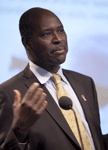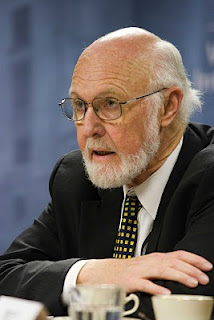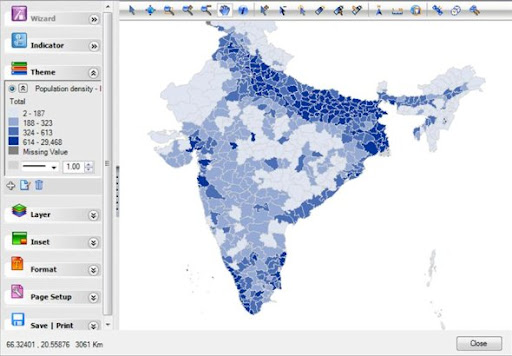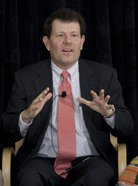Showing posts from category *Main.
-
Human Resources for Maternal Health
› “Pregnancy is not a disease, a woman should not die of pregnancy…it doesn’t need a new drug…it doesn’t need research – we just need skilled workforce at different levels,” argued Seble Frehywot, assistant research professor of Health Policy and Global Health at George Washington University, at the Global Health Initiative’s second event of the Advancing Policy Dialogue on Maternal Health Series.
“Pregnancy is not a disease, a woman should not die of pregnancy…it doesn’t need a new drug…it doesn’t need research – we just need skilled workforce at different levels,” argued Seble Frehywot, assistant research professor of Health Policy and Global Health at George Washington University, at the Global Health Initiative’s second event of the Advancing Policy Dialogue on Maternal Health Series.
Research shows that increased access to skilled health workers during pregnancy and delivery, including midwives and other practitioners, can significantly reduce maternal mortality in developing countries. One solution to the current human resource crisis is to expand, and in many cases, acknowledge, the skills and responsibilities of non-physician health workers.
Task-Sharing: Who, What, and How
“There are too many preventable deaths…if we look at the data, quality maternal health services are not available,” argued Frehywot, as she presented the following evidence:
There are four common types, or levels, of task-shifting:- Countries that have the highest maternal mortality rates are those that also have the greatest worker shortage
- In Africa, for every 10,000 births, only 2 physicians and 11 nurses or midwives are present at delivery.
- According to the World Health Organization, there needs to be at least 53 skilled health care workers (nurses, doctors, midwives) per 10,000 births to meet Millennium Goal 5 which seeks to reduce maternal deaths by 75 percent by 2015.
1. Doctors to non-physician health clinicians
“All [task-shifting] needs to be done through a sound regulatory framework…it is very important to match tasks that are needed at the ground level with the competency needed to back it up,” maintained Frehywot. Regulatory issues such as the scope of practice, standard of care, training, licensure, and supervision must be addressed to ensure safe and high-quality treatment. Additionally, political buy-in and commitment from the Ministry of Health, medical universities, and professional councils and associations are necessary for long-term development, argued Frehywot.
2. Health clinicians to registered nurses and midwives
3. Nurses/midwives to community health care workers
4. Community health care workers to expert patients
Policies for scaling-up human resources should start at the district level, as these localized hospitals are geographically closest to the need, argued Frehywot. “If one really wants to decrease the maternal mortality ratios, especially by 2015, this is where most of the people live.”
Applying Task-Shifting in Afghanistan “Maternal mortality ratios in Afghanistan are the second highest in the world,” declared Jeffrey Smith, regional technical director for Asia at Jhpiego. In 2002, when Smith arrived in Afghanistan, there were limited health workers, most with out-of-date skills, and no functional schools for training. “The most important decision made early in the reconstruction [of] Afghanistan was that midwives would be the backbone of the reproductive health workforce and they would be empowered with the skills to perform the tasks necessary for provision of basic emergency obstetric care,” shared Smith.
“Maternal mortality ratios in Afghanistan are the second highest in the world,” declared Jeffrey Smith, regional technical director for Asia at Jhpiego. In 2002, when Smith arrived in Afghanistan, there were limited health workers, most with out-of-date skills, and no functional schools for training. “The most important decision made early in the reconstruction [of] Afghanistan was that midwives would be the backbone of the reproductive health workforce and they would be empowered with the skills to perform the tasks necessary for provision of basic emergency obstetric care,” shared Smith.
Making the case for task-shifting, Smith discussed the importance of empowering health workers on the front line so that they may provide services in the most peripheral areas. “Task shifting should not be a temporary fix until we have more doctors,” argued Smith, as this framework disenfranchises a cadre of health workers and fails to build long-term solutions for human resources. Instead, Smith advocated for the “Health Center Intrapartum Care Strategy” that makes midwives the foundation of care and includes strategies for training, staffing, and linkages to the overall health system.
In this post-conflict setting, task-shifting began as an emergency approach. However, it rapidly became a development strategy for professionalizing the workforce and rebuilding the health system. Afghanistan’s Ministry of Public Health was imperative to the success of scaling up midwives as they clearly defined from the beginning what was needed and who would provide care, taking steps to ensure that the midwifery schools maintained legitimacy and received formal accreditation.
“Keep it clinical and keep it local,” shared Smith. The midwifery schools made efforts to recruit individuals from the provincial level, teaching specific life-saving skills applicable in the field. This framework has successfully retained 86% of its graduates, and many of the women report that the program has provided them with a sense of community and ownership.
Building a Sustainable Health Workforce “We invite the maternal health community to take advantage of the incredible momentum that human resources for health is having right now,” shared Pape Gaye, president and CEO of IntraHealth. While there are many issues within the health system that need to be strengthened, Gaye maintained that “we must pick our battles” and advocated for an emphasis on scaling-up the training and availability of midwives.
“We invite the maternal health community to take advantage of the incredible momentum that human resources for health is having right now,” shared Pape Gaye, president and CEO of IntraHealth. While there are many issues within the health system that need to be strengthened, Gaye maintained that “we must pick our battles” and advocated for an emphasis on scaling-up the training and availability of midwives.
In order to scale-up midwives for maternal health we must avoid the same old traps, particularly the lack of donor coordination shared Gaye. “If we do a better job of improving coordination we will start solving the problem.” Additionally, Gaye discussed the implications for training generation “Y,” emphasizing the importance of including new technologies available for training, including PDA’s and e-learning courses.
Performance outcomes and training are the two key pillars of effective scale-up, shared Gaye. Task-shifting also requires legal support and the endorsement from medical associations to help legitimize this new health system framework. “This is not simple work; you really need to have a systems approach. What we seek in the end is good integration. Integration across systems, integration across roles, courses, learning processes, and training for maximum adaptability,” shared Gaye. -
Walker’s World: From Warming to Warring: A Review of Cleo Paskal’s New Book
›January 15, 2010 // By Wilson Center StaffWilson Center Senior Scholar Martin Walker recently reviewed Global Warring: How Environmental, Economic, and Political Crises Will Redraw the World Map by Cleo Paskal, for his UPI column, “Walker’s World.”
Excerpts: The Copenhagen summit showed that climate change is as much about geopolitics and power as it is about the weather. China‘s blunt refusal to accept any binding limits on its carbon emissions, despite the agonized pleas of small island governments facing extinction, demonstrated that this new aspect of the game of nations is going to be played as hardball.
The Copenhagen summit showed that climate change is as much about geopolitics and power as it is about the weather. China‘s blunt refusal to accept any binding limits on its carbon emissions, despite the agonized pleas of small island governments facing extinction, demonstrated that this new aspect of the game of nations is going to be played as hardball.
And yet, as Cleo Paskal argues in her pioneering new book “Global Warring,” China is also powering ahead on every aspect of climate change. While protecting its right to pollute (because it depends heavily on coal as its main homegrown energy source), China is using state subsidies to seize the lead in solar power manufacturing….But perhaps Paskal’s most striking story is the way that China is also seeking to become a major player in the arctic. China has acquired an icebreaker, a seat with observer status on the Arctic Council and its own arctic research base at Svalbard. (China also has two research bases in the Antarctic.) …
Paskal’s book is full of such vignettes, illustrating the way that climate change and the intensifying competition for resources is starting to change the nature of power politics. Paskal, a Canadian who is a fellow of London’s prestigious Chatham House think tank and a consultant for the U.S. Department of Energy, has been a pioneering scholar of the new terrain where climate change confronts national security, where geopolitics, geoeconomics and global warming all collide. It is not just rivalry for oil and gas supplies and water, but also for fishing rights and undersea mining and mineral rights that may well be up for grabs when some of the lowest-lying Pacific island countries disappear under the rising waves. …
“We need to start thinking about the legal and economic implications of these developments now, before we have to start tackling them in the middle of a crisis or a humanitarian emergency,” Paskal told a seminar at Washington’s Woodrow Wilson Center Friday. …
Paskal sees China and Russia taking these issues more seriously that the United States and Europe, and her book is not just a wakeup call for Western leaders but is also an arresting and original work on climate change, probably the most important book on the environment to be published this year.
“As pressure is put on food, water supplies and national boundaries, famine and war may become more frequent,” Paskal concludes. “This instability may make populations more tolerant of autocratic governments, especially nationalistic capitalist ones where the political, economic and military sectors combine to protect existing resources and aggressively try to secure new ones. China and Russia already have a head start on this model.” -
An Island of Peace in a Sea of Conflict: The Jordan River Peace Park
›Saleem Ali filmed this video on his visit to the “peace island” between Jordan and Israel, which Friends of the Earth Middle East (FOEME) is working to convert into an international peace park.
FOEME co-Director Gidon Bromberg will be at the Wilson Center today to discuss the peace park and other FOEME water cooperation initiatives in more detail as a panelist participating in “Pathways to Peace: Stories of Environment, Health, and Conflict,” an event discussing field-based lessons for addressing environment, health, development, and conflict.
Video: Filmed by Saleem H. Ali (University of Vermont, editor of the MIT Press book Peace Parks: Conservation and Conflict Resolution) with commentary by Elizabeth Ya’ari (FOEME), January 2010. -
Reforming Development: New Year’s Resolutions for Policymakers
›The foreign policy headlines are dominated by terrorism, Iraq and Afghanistan, the Arab-Israeli dispute, and North Korea and Iran’s nuclear weapons.
Under the radar, however, a quiet revolution is going on. Policymakers from the Pentagon to Capitol Hill are proposing ways to modernize development policy to meet the demands of foreign policy in the 21st century.
Development Seeking Its Place Among the Three “D”s—Diplomacy, Development and Defense
Three major efforts launched in 2009 are expected to be completed in 2010:- The State Department’s “Quadrennial Diplomacy and Development Review” of operations at State and USAID is due in Fall 2010; preliminary recommendations are scheduled for this month.
- The White House’s review of global development policy will involve all government agencies with development programs. Headed by National Security Advisor Jim Jones and NEC head Larry Summers, the team will report out in the next few months.
- Congress, which for a long time has paid little attention to these issues, also is making development reform a priority. Both the Senate and the House are writing new legislation to replace the current bill, which was last overhauled in 1961.
A new policy framework is long overdue. Everyone agrees that the Obama administration inherited a system that is broken and must be fixed. But how? I propose seven New Year’s resolutions for policymakers trying to revamp development.
1. Address all the myriad issues that impact American interests and for which development aid could be an important policy tool.
Promoting development is critical to a diverse range of cross-cutting issues:- preventing violent conflicts
- restoring economic growth and dampening financial instability
- expanding global trade
- dealing with global climate change
- dealing with global pandemics and other health challenges
- eliminating absolute poverty
2. Lay out a government-wide “national development strategy” that sets clear goals and objectives for US development policy—and doesn’t just tinker with organizations and budgets.
Development promotion, broadly defined, must be an important part of the solution. But any new strategy must go beyond just reforming the aid program.
While needed, new policies and programs are costly. The sooner they are put into place, however, the lower the long-term costs of not addressing them will be.
3. Include all the parts of the U.S. government that are now engaged in promoting development.
Existing development capacities are spread throughout the executive branch, and, in some cases, the private sector. Currently 25 departments, 25 agencies, and almost 60 offices are involved in making or implementing development policy. There is no central oversight, planning, budgeting, implementation, or evaluation.
There must be a central point within the government that monitors and coordinates all development programs. Past experience indicates that only the White House, with a strong presidential mandate, can effectively pull off this coordination. Many previous attempts at reform have foundered because the executive branch refused to take congressional initiative seriously.
4. Reflect on lessons learned over the past 60 years.- While liberalized trade and economic openness can improve growth, each country must craft its own strategies.
- Growth is important, but it alone will not eliminate poverty. Measures that directly address poverty are important for their own sake, and if done right, will enhance economic growth as well.
- Similarly, good governance and democracy are important for growth, but are also important goals in their own right. Participatory decision-making is critical to program success.
- Conflict, with its high human costs, is not caused by poverty and lack of development, but makes the solution to other problems much more difficult.
- Investments in poor people, and particularly poor women, pay high dividends. Measures increasing access to education and health, redistributing productive assets (credit and land), and supporting small-scale rural and urban enterprises are particularly effective.
The United States is now one of many players in the development game. In fact, in all but a few countries, it is not even the major aid provider. In Southeast Asia, China, Japan, or India are more likely to be the major donors; in Africa, it is the European Union or China.
Furthermore, many nongovernmental funders have joined the field. The Gates Foundation has spent more than $12 billion on its Global Health Program. Ford and other U.S. foundations are seeking to rebuild African universities, and companies like Mars and FedEx are running technical assistance programs. In addition, American private voluntary agencies have raised over $10 billion in private funds—more than some European aid donors.
Trade and private financial transactions dwarf official development assistance (ODA). For instance, remittances from migrants to their home countries are approaching US$300 billion a year, nearly 50 percent more than all ODA. Frankly, trade liberalization and financial stability will have greater impact on development than any increase in ODA.
As a result of these seismic shifts, U.S. development policy needs to be smarter and more strategic, mobilizing new and different ways to engage governments, corporations, universities, foundations, and civil society (as is now being done for with HIV/AIDS).
6. Make fundamental changes to existing aid structures, which have atrophied over the years.
Currently, USAID is not equipped to deal with the challenges of the 21st century. It is considerably understaffed and lacks the necessary technical skills, particularly in agriculture and institution-building. The agency has no capacity to think strategically about the global development environment and lacks a voice at policy tables. Furthermore, new independent development agencies, such as the Millennium Challenge Corporation and PEPFAR, have proliferated
A revamped U.S. aid program needs a strategy that would:- Give responsibility for formulating and implementing development strategies to the user country, thereby transferring ownership and increasing effectiveness. Providers, of course, can then choose whether or not they want to support the country’s strategy.
- Agree on a more rigorous, transparent, performance-based approach to allocating ODA.
- Give equal priority to global problems, regional needs, and country priorities.
A long-term commitment is essential because these significant changes will not be implemented overnight. It will take the next three years of President Obama’s tenure (and perhaps longer) to change long-embedded policies and practices. Remember, the Defense Department was established in 1948, but did not fully integrate the three services until the Goldwater-Nichols Act of 1986—almost 40 years later.
New Year’s resolutions are often broken as the tough work of fulfilling them becomes all too apparent. But breaking these resolutions will adversely affect U.S national interests in the coming decades. As Secretary of State Clinton argued recently, development “is a strategic, economic, and moral imperative – as central to advancing American interests and solving global problems as diplomacy and defense.”
The administration and Congress now have an opportunity to set development policy on a new course. Let’s hope they take it.
John Sewell is a senior scholar at the Woodrow Wilson International Center for Scholars. -
Welcome Back, Family Planning
›January 8, 2010 // By Gib Clarke “When women and girls have the tools to stay healthy and the opportunity to contribute to their families’ well-being, they flourish and so do the people around them,” Secretary of State Hillary Clinton declared today in a speech renewing U.S. support for universal access to reproductive health services and supplies around the world. “Investing in the health of women, adolescents, and girls is not only the right thing to do; it is also the smart thing to do.”
“When women and girls have the tools to stay healthy and the opportunity to contribute to their families’ well-being, they flourish and so do the people around them,” Secretary of State Hillary Clinton declared today in a speech renewing U.S. support for universal access to reproductive health services and supplies around the world. “Investing in the health of women, adolescents, and girls is not only the right thing to do; it is also the smart thing to do.”
Introduced by Melanne Verveer, the first ever ambassador-at-large for global women’s issues, Clinton’s much anticipated statement marked the 15th anniversary of the International Conference on Population and Development (ICPD) and reconfirmed a U.S. commitment to meeting Millennium Development Goals 4 (reducing child mortality) and 5 (reducing maternal mortality and increasing the proportion of births attended by skilled health personnel). Reproductive health and development luminaries Nafis Sadik, UN Foundation President and former Senator Tim Wirth, and newly installed USAID Administrator Rajiv Shah were also in attendance.
Clinton began with a look back to the ICPD—which she called the “first ever global forum that recognized the connection between women’s health, the quality of women’s lives, and human progress on a broader scale”—and the progress since. Declaring that “we have made measurable progress since 1994 in improving the health and the lives of women and children, especially girls,” she cited a number of improvements, including higher child survival rates, use of modern contraceptives, and female education enrollment.
Switching from the past to the present, Clinton described how women and girls continue to bear the brunt of a variety of social ills: they have higher rates of poverty, illiteracy, and malnutrition, and are the most adversely affected by conflict, “from the Congo to Bosnia to Burma.”
After reciting the data on unsafe abortions, STDs and HIV/AIDS, fistulas, and female genital cutting, she declared that “these numbers are not only grim…they are intolerable.” She added, “We can not accept it morally, politically, socially, economically.”
But Clinton’s remarks were not solely focused on health and family planning issues. Echoing arguments made by Nicholas Kristof and others, Clinton described how women’s health and women’s rights directly and significantly impact most major problems in the world, including economics, natural resource conflicts, and national security.
These challenges will require sustained effort and funding, said Clinton, adding that the Obama Administration’s $63 billion Global Health Initiative would address the health challenges of HIV/AIDS and maternal and reproductive health in an integrated manner. All of the administration’s programs would seek to help countries strengthen their own health systems to meet their unique needs—both of their women and girls, but also their populations in general. In all of these efforts, she said including men and boys as “advocates and allies” remains important.
Praise for the speech has been swift—a letter of commendation from a number of foundations was sent to the secretary immediately afterwards.
Maternal and reproductive health have experienced elevated and perhaps unprecedented funding and attention in recent years, especially over the last few months. Secretary Clinton’s impassioned speech is almost certain to keep this momentum alive.
Photo: Courtesy SEIU International -
2010: Worldwide Year of the Census
›To kick-off the New Year, we’re highlighting CensusInfo 2010—an initiative to help countries distribute their census data in a format that is free, flexible, and customizable to meet diverse public needs. For us, it’s a new tool to access and visualize census data from around the globe.
The CensusInfo software(the program must be downloaded and installed) allows users to create tables, graphs, and color-coded maps depicting indicators such as population density, fertility rate, and sex ratio. The data’s resolution—national, regional, district, or smaller—is up to the user, but limited by the information reported by each country’s census bureau. When older data is available, users can also view trends over time.
The heart of CensusInfo is data presentation. Robust options include: capacity to import new datasets, compatibility with Google Earth and NASA’s World Wind technologies, and the ability to download visualizations as images, “animated flipbooks,” and videos.
Aside from the relatively steep learning curve to master each of its functions, the software is principally limited by the small number of countries in its database: only 10 countries are included in the software’s pre-installed dataset. That number, however, could increase in the near future.
In what CensusInfo 2010 hopes will be a trend, the Palestinian Central Bureau of Statistics, as of August 2009, became the first National Office of Statistics to independently incorporate its data into CensusInfo. While a powerful piece of software, CensusInfo’s potential rests on whether others follow suit.
Photo Credit: CensusInfo’s output of population density in India. -
Making the Connections: An Integration Wish List for Research, Policy, and Practice
›January 3, 2010 // By Geoffrey D. DabelkoNew York Times columnist Nick Kristof is likely a well-known voice to New Security Beat readers. His ground-level development stories from around the world expose a range of neglected issues that usually struggle for mainstream media coverage: maternal health, microcredit, human trafficking, family planning, sanitation, micronutrients, and poverty, among others.
Kristof brought many of these threads together Half the Sky, a book he coauthored with his wife Sheryl WuDunn. I asked about the challenges of addressing these connected problems when I interviewed the couple and two frontline White Ribbon Alliance maternal health practitioners this fall at the Wilson Center.
Now Kristof is asking readers to suggest topics for him to cover in 2010. My suggestions to him are actually a wish list for the wider development community. In short, how can scholars, policymakers, practitioners, and communities better research and analyze these connected topics and then fashion integrated responses? I posted my comment on Kristof’s blog, On the Ground (and I ask your indulgence for the less than polished writing):I’d love for you [Kristof] to explore the challenge of integration from both problem and response perspectives. People in poverty lead integrated lives (just like we wealthier folks do), face connected challenges, and need integrated or multiple responses. Single-sector programs may deliver quicker, more obvious, and/or more countable impacts (or parallel advantages for single-discipline research endeavors). Yet time and time again we see such approaches only partially meeting needs or not meeting them sustainably. There is also a persist danger of undercutting others’ efforts and/or creating high opportunity costs.
These questions topped my wish list to Kristof last night while procrastinating on other writing. What would be on your wish list for Kristof, the development community, or even just New Security Beat? We at the Environmental Change and Security Program (ECSP) would love to hear from NSB readers so we can keep covering the questions that interest you.
So which integrated research, policy analysis, or field-based programs explicitly recognize that trends that appear to be on the periphery are hardly peripheral? At the same time, if programs try to be all things to all people, they can become bloated, unrealistic, and/or unsustainable.
For example, are the Millennium Villages examples of the former or the latter? How about the much smaller programs under the population-health-environment grouping? What went wrong with Campfire programs to cause so many to abandon the approach? Have the loosened restrictions on what constitutes an appropriate PEPFAR intervention addressed this integration problem, or will politics (exclusion of family planning in PEPFAR, for example) mean we cannot capture the full benefits of integration?
And the big Kahuna: how is the rhetoric and analytical argument around the 3Ds (defense, development, and diplomacy) made real and practicable in the field (as in the United States we anticipated early this year the results of the Quadrennial Defense Review (QDR), Quadrennial Diplomacy and Development Review (QDDR), and Presidential Study Directive on Global Development Policy (PSD))?
And finally, does our (read donors’) penchant for measuring impact and quantifying results force us to narrow interventions to the point of missing key connections in cause and effect of the problems we are trying to address? Is there a better mix of defining and measuring success that captures the challenges and benefits of integration? -
‘DotPop: ’ New Toolkit for Population, Health, and Environment
›December 29, 2009 // By Wilson Center StaffThe PHE Toolkit, launched by Building Actors and Leaders for Advancing Community Excellence in Development (BALANCED), is a new source of information and resources on Population, Health, and Environment (PHE).
The interactive online library of documents, videos, and other resources will provide “one-stop shopping” for the target audience of program managers working on health, family planning, development, and conservation programs—as well as policymakers, researchers, academics, and educators. All users can contribute resources and participate in discussions through the toolkit.
The Environmental Change and Security Program, along with several PHE partner organizations, helped build the framework and will contribute its PHE resources to the toolkit. ECSP is also a member of the PHE Gateway, which can be accessed through the toolkit.
The PHE toolkit is one of five public toolkits housed on the Knowledge for Health (K4Health) website, which is supported by USAID’s Bureau of Global Health. Together, the current and forthcoming toolkits will form an updated and vibrant community for information on health, including family planning, HIV/AIDS, and reproductive health.
The PHE toolkit is made possible through the collaboration of Johns Hopkins University Center for Communication Programs (JHU/CCP) and the BALANCED Project. BALANCED is spearheaded by the Coastal Resources Center (CRC) at the University of Rhode Island and its partners, PATH Foundation Philippines Inc. and Conservation International.


 “Pregnancy is not a disease, a woman should not die of pregnancy…it doesn’t need a new drug…it doesn’t need research – we just need skilled workforce at different levels,” argued Seble Frehywot,
“Pregnancy is not a disease, a woman should not die of pregnancy…it doesn’t need a new drug…it doesn’t need research – we just need skilled workforce at different levels,” argued Seble Frehywot,  “
“ “We invite the maternal health community to take advantage of the incredible momentum that human resources for health is having right now,” shared Pape Gaye, president and CEO of IntraHealth. While there are many issues within the health system that need to be strengthened, Gaye maintained that “we must pick our battles” and advocated for an emphasis on scaling-up the training and availability of midwives.
“We invite the maternal health community to take advantage of the incredible momentum that human resources for health is having right now,” shared Pape Gaye, president and CEO of IntraHealth. While there are many issues within the health system that need to be strengthened, Gaye maintained that “we must pick our battles” and advocated for an emphasis on scaling-up the training and availability of midwives.
 “When women and girls have the tools to stay healthy and the opportunity to contribute to their families’ well-being, they flourish and so do the people around them,” Secretary of State
“When women and girls have the tools to stay healthy and the opportunity to contribute to their families’ well-being, they flourish and so do the people around them,” Secretary of State 



